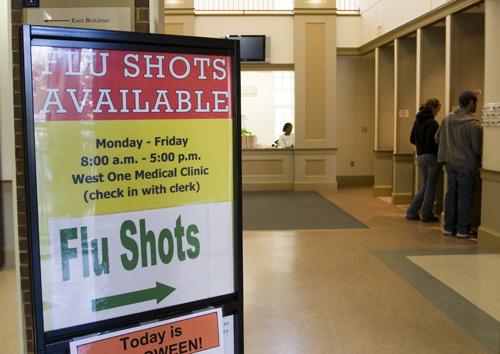Flu season sickness avoidable

A sign in the lobby of Mckinley points students to where they can recieve their flu shots. Erica Magda
November 3, 2008
Cold and flu season is upon us, but getting sick is not unavoidable.
Simply developing some healthy habits can be very helpful in preventing sickness.
“If you don’t get the virus, you can’t get the cold,” said Dr. David Lawrance, a staff physician at McKinley Health Center.
Lawrance said in order to not get the virus, it is important to avoid sharing germs.
This may seem obvious, but Lawrance recalled visiting a fraternity house several years ago where there was one water glass in the bathroom for the entire floor to share. Even if someone isn’t showing symptoms of being sick, they can still carry a virus, so it is important to avoid sharing drinks with other people.
Get The Daily Illini in your inbox!
“Most importantly, avoid sharing things other people have had in their mouths,” he said.
Lawrance said another obvious habit, but one that is proven to be effective, is to wash or sanitize hands to kill germs. He added that in order to keep from contaminating hands, it is important to cough or sneeze into the sleeve instead of the hand. Also, always using a clean tissue can prevent the spread of germs.Lawrance said good nutrition is also an important factor in staying healthy during cold and flu season.
Justine Karduck, nutrition education coordinator and Sportwell coordinator at Oasis, said a proper diet can help prevent colds and the flu.
“The best thing to do is eat a well-rounded diet with plenty of variety,” she said.
Eating plenty of fresh fruits and vegetables can help to ward off diseases, Karduck said. Also, taking in fatty fish, like salmon or tuna, can help with decreasing inflammation. It is also important to have plenty of whole grains and sources of protein for a well-balanced diet.
As far as vitamins go, Karduck said it is also important to get plenty of zinc and vitamin C, two nutrients that are good for preventing illness. She said zinc comes from meat products while vitamin C comes mostly from citrus fruits, but also from other fresh fruits and vegetables. A multivitamin might be recommended since a lot of college students’ diets are not up to par, she said.
“It almost acts as a security blanket when you aren’t always eating the healthiest choices,” Karduck said.
Proper hydration is very important as well. About eight cups of water a day is recommended.
“Just look at your urine and that will be the best indicator,” Karduck said.
Karduck said if properly hydrated, urine should look like lemonade, but if it is concentrated and looks more like apple juice, the body is dehydrated. She also said alcohol can cause dehydration, so binge drinking while sick will delay recovery.
Lawrance said several hundred flu shots are given each day, but many students do not get the vaccine because they have not received it in the past. The goal is to give 6,000 flu shots before Thanksgiving break.
Caitlin Stevenson, freshman in LAS, said she is not getting a flu shot.
“I’ve never actually had one, ever,” she said.
Stevenson said she always washes her hands and tries to drink a lot of water to keep from getting sick, and once she gets sick, she tries to eat healthier.
Still, flu shots at McKinley are free to students.
“A lot of us don’t get the flu because we get a flu shot,” Lawrance said.






